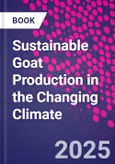Sustainable Goat Production in the Changing Climate aims to make the global scientific and academic communities aware of the potential of goats as a livestock of the future. When compared to more popular meat sources like cattle and swine, goats have a lower carbon footprint and can aid in mitigating the effects of climate change, as well as improving food production, poverty and equity issues. This book will discuss the implication of climate change on goat production systems and emphasize the physiological potential of goats to adapt in erratically changing climatic conditions. Furthermore, the book includes chapters on strategies to mitigate the effects of climate change on goat production and highlights novel technologies used to assess the impact of heat stress in goats. Technology transfer strategies and policy-related issues will also be covered.
Written and edited by an international team of experts on goats, livestock, animal agriculture, and climate-smart food systems, Sustainable Goat Production in the Changing Climate will appeal to a broad audience, from researchers, to livestock specialists, to veterinarians, to policy makers in food and sustainability.
Table of Contents
Section I: Climate Change and Goat welfare1. Heat stress associated welfare indicators based on behavioural, physiological, endocrine, and biochemical response
2. Transportation of goats during summer season
Section II: Impact of Climate Change on Goat Production
3. Heat stress impact on growth performance in goats
4. Heat stress impact on reproductive performance in goats
5. Heat stress impact on meat characteristics and quality in goats
6. Climate change impact on products quality in goats
7. Heat stress impact on immune response in goats
8. Climate change associated nutritional stress on goat performance
9. Walking stress impact on goat production
10. Climate change associated water stress impact on goat production
11. Climate change associated disease occurrences in goats
Section III: Molecular mechanisms governing Goat Adaptation to climate change
12. Role of molecular chaperons governing heat stress response in goats
13. Heat stress mediated changes in the rumen microbiota in goats
14. Heat stress associated changes in the whole transcriptomics profile in goats
15. Epigenetic changes associated with goat adaptation
Section IV: Strategies to sustain goat production in the changing climate scenario
16. Enteric methane emission and strategies for mitigation in goats
17. Management strategies to sustain goat production
18. Challenges associated with controlling internal parasites in goats
19. Nutritional interventions to augment goat production
20. Biotechnological tools and genetic approaches to optimize goat production in changing climate scenario
21. Climate resistant technologies for goat production
22. Extension strategies in adaptation to climate change with a special reference to goat farming
23. Strengthening Climatic research-Extension-Farmers linkages to promote climate resilience goat production system
24. Climate change associated economic implications of goat farming and role of women in mitigating the effects
25. Adaptation of livestock services delivery system to mitigate the effects of climate change on goat farming
26. Policies upscaling for future goat production
Section V: Conclusion and Future Projections
27. Concluding remarks and future researchable priorities








